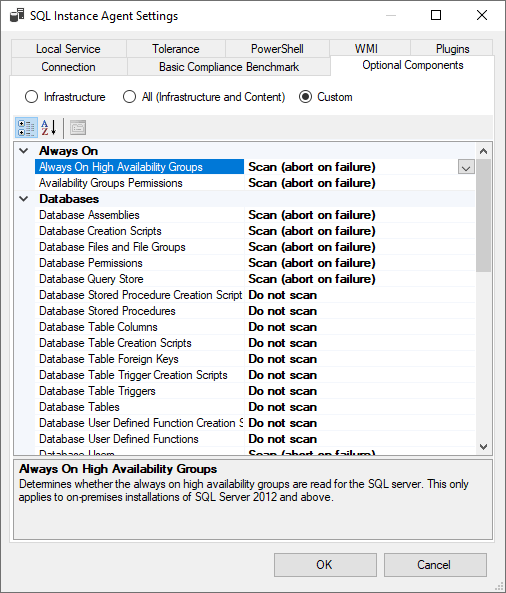Optional Components

Infrastructure
Configures the optional components to collect common infrastructure information but does not collect content including tables, stored procedures, user defined functions, or views.
All (Infrastructure and Content)
Configures the optional components to collect all information including tables, stored procedures, user defined functions, or views.
Custom
Configures the optional components to use custom settings.
Always On High Availability Groups
Determines whether the always on high availability groups are read for the SQL server. This only applies to on-premises installations of SQL Server 2012 and above.
Availability Groups Permissions
Determines whether the permissions for availability groups are read for the SQL server. This only applies to on-premises installations of SQL Server 2012 and above.
Database Assemblies
Determines whether assemblies are read for databases hosted by the SQL instance.
Database Creation Scripts
Determines whether the creation scripts are read for databases hosted by the SQL instance.
Database Files and File Groups
Determines whether the files and file groups are read for databases hosted by the SQL instance. This applies to on-premises SQL Server installations.
Database Permissions
Determines whether the permissions are read for databases hosted by the SQL instance.
Database Query Store
Determines whether the query store settings are read for databases hosted by the SQL instance. This applies to Azure and on-premises SQL Server 2016 and above.
Database Stored Procedure Creation Scripts
Determines whether the creation scripts for stored procedures are read for databases hosted by the SQL instance.
Database Stored Procedures
Determines whether the stored procedures are read for databases hosted by the SQL instance.
Database Table Columns
Determines whether the columns of tables are read for databases hosted by the SQL instance.
Database Table Creation Scripts
Determines whether the creation scripts are read for tables hosted by the SQL instance.
Database Table Foreign Keys
Determines whether the foreign keys of tables are read for databases hosted by the SQL instance.
Database Table Trigger Creation Scripts
Determines whether the creation scripts are read for triggers for databases hosted by the SQL instance.
Database Table Triggers
Determines whether the triggers of tables are read for databases hosted by the SQL instance.
Database Tables
Determines whether the tables are read for databases hosted by the SQL instance.
Database User Defined Function Creation Scripts
Determines whether the creation scripts for user defined functions are read for databases hosted by the SQL instance.
Database User Defined Functions
Determines whether the user defined functions are read for databases hosted by the SQL instance.
Database Users
Determines whether the users are read for databases hosted by the SQL instance.
Database Views
Determines whether the views are read for databases hosted by the SQL instance.
Databases
Determines whether the databases are read for the SQL instance.
Databases (Snapshots)
Determines whether database snapshots are read for the SQL instance.
Databases (System Databases)
Determines whether system databases are read for the SQL instance.
Host Information
Determines whether the host information is read for the SQL server. Host information is required to gather the serial number which is used as the secondary item identifier for non-clustered on-premises installations of SQL Server. Changing this setting can cause duplicate items to be created.
This only applies to on-premises installations of SQL Server.
Host Information Scan Method
The method by which the agent will gather host information for the SQL server.
Hosts Information (Clusters)
Determines whether the host information is read for clustered SQL server instances. This only applies to on-premises installations of SQL Server.
Database Mail Configuration
Determines whether the database mail configuration should be read for the instance. This only applies to on-premises installations of SQL Server.
Maintenance Plans
Determines whether maintenance plans are read for the SQL server. This only applies to on-premises installations of SQL Server.
Resource Governor
Determines whether the resource governor configuration is read for the SQL server. This only applies to on-premises installations of SQL Server.
Credentials
Determines whether credentials are read for the SQL server. This only applies to on-premises installations of SQL Server.
Cryptographic Providers
Determines whether cryptographic providers are read for the SQL server. This only applies to on-premises installations of SQL Server.
Logins
Determines whether the logins are read for the SQL instance.
Server Permissions
Determines whether the server permissions are read for the SQL instance.
Server Roles
Determines whether the server roles are read for the SQL instance.
Backup Devices
Determines whether backup device information is read for the SQL server. This only applies to on-premises installations of SQL Server.
Endpoints
Determines whether endpoint information is read for the SQL server. This only applies to on-premises installations of SQL Server.
Agent
Determines whether agent settings are read for the SQL server. This only applies to on-premises installations of SQL Server.
Alerts
Determines whether alerts are read for the SQL server. This only applies to on-premises installations of SQL Server.
Jobs
Determines whether the jobs are read for the SQL server. This only applies to on-premises installations of SQL Server.
Operators
Determines whether the operators are read for the SQL server. This only applies to on-premises installations of SQL Server.
Proxy Accounts
Determines whether the proxy accounts are read for the SQL server. This only applies to on-premises installations of SQL Server.